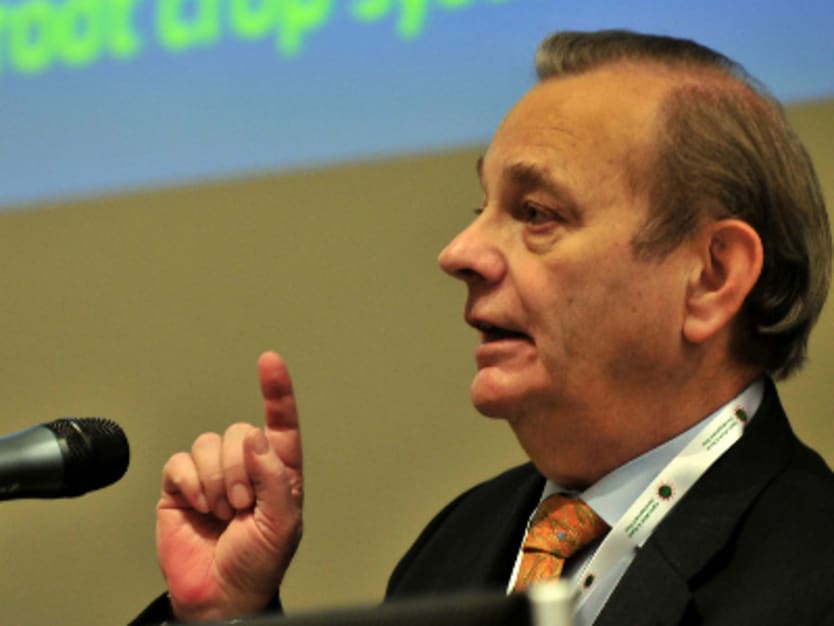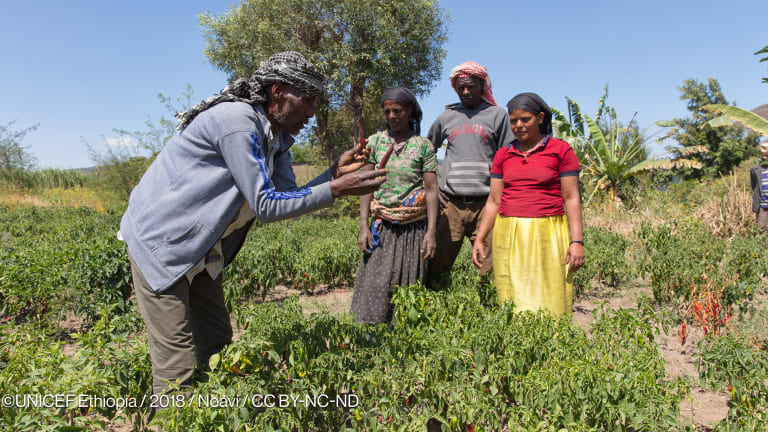
Resilient agricultural growth needs proactive policy design and investment driven by political leadership that demonstrates the necessary vision and will. The authors of the Montpellier Panel’s 2012 report, titled ”Growth with Resilience: Opportunities for African Agriculture”, recognize this and have outlined what this resilient growth entails.
Gordon Conway – agricultural ecologist, professor of international development at the Centre for Environmental Policy, and director of Agriculture for Impact in Imperial College, London – chairs the panel that authored the report. In this interview, he reiterates that investment in “resilient agricultural growth … can achieve sustainable food and nutrition security for the continent and significantly contribute to the African and global economy.”
What do you understand by the concept of resilience as applied to smallholder farming systems and livelihoods in Africa?
It is about the stresses and shocks that farmers experience and how they cope with them: pests, diseases, a collapse in the market or, increasingly, the effects of climate change, increasing heat, drought or cataclysmic events such as cyclones.
Farmers are used to coping when things go wrong, whether they are in France, the United Kingdome, Niger or Malawi. But the burden of stresses and shocks is increasing. Farmers need to improve their capacity to be resilient. Resilience has to be built at different levels, from the individual farmers, to the community and to the government.
What roles do you see for both the private and public sectors in contributing to resilient farming systems and livelihoods?
Both need to understand that farmers are part of the private sector and they are private sector actors. The larger private sector has to help farmers by linking them to – or by creating – fair and stable markets. This includes both input and output markets. On the input side, the private sector can consist of village shops (so-called agro-dealers) that sell feed, seed, and fertilizer in small quantities. The farmers need to find these inputs close to where they farm the land so they do not have to walk long distances – and the seeds must be certified.
On the output side, farmers should be able feed their families, but also have more crops to sell. With new [certified] seeds, it is possible to feed your family and to have extra grain or maize to take to a warehouse and a bigger market.
For this to happen we need aggregation; that is, small companies set up to buy grain or maize and take it to a warehouse and eventually the bigger market, maybe even the regional market. It may be that in the private sector there is a quasi-private cooperative that organises the sale or there could be contract farming. There are many ways to do this, but for it to be efficient, it must be done by the private sector.
The public sector is also crucial because to start up a seed company, a government or donor subsidy is needed – or a subsidy might be needed for the seed. The public sector is responsible for creating the right business environment, which means implementing the proper regulations, especially to ensure that the seed is properly certified and that markets act fairly. Government must also provide extension and education for farmers.
Most importantly, sufficient infrastructure is essential: physical, or hard infrastructure, such as all-weather roads to service input and output markets; and soft infrastructure such as weather information and communications technologies to connect farmers to markets. This involves a public and private component and perhaps a joint subsidy.
Transactions with individual farmers are small, but the costs of these transactions are large. Farmers need to be provided with credit by banks. However, sometimes it costs banks more money than the loan itself to process credit. Systems are needed for the money to go to intermediaries – cooperatives or agencies – that provide microcredit.
If all of these elements are in place, you have the basis of a resilient agricultural economy, which means everything is working as well as it can despite what happens. It won’t shield farmers completely from shocks and stresses, but it makes them more resilient.
The Montpellier Report calls on governments and the private sector to work together in a number of areas, including reducing food price volatility, facilitating private investments and building better enabling environments. What incentives exist – or should exist – to encourage the private sector to invest responsibly in agriculture in sub-Saharan Africa? How can governments encourage private sector investments?
The potential for high productivity in sub-Saharan Africa is enormous. Today there is an average grain yield of 1 tonne per hectare. This used to be the yield in the time of the Romans! This is not good. India and China get much more and in Europe, the yield is up to 10-12 tonnes per hectare.
The potential exists – good soil and water are available. But good quality, certified seeds are needed, the soils must be fertilised and the water must be properly channelled. I have seen farms inZambiagetting more than 5 tonnes per hectare and in Malawi, the yield is 2-3 tonnes per hectare per year with subsidies.
There is money to be made, but farmers must be treated fairly. They need a decent return as well. An ideal way to do this is to create a pilot or ‘nuclear estate’ whereby a company sets up a large area of land and a plantation for a crop – soy, sugar, coffee cocoa, maize or horticultural products – and smallholders around the estate are organised into a cooperative.
This model helps to build resilience because there is a foreign or indigenous company behind the nuclear estate that brings in modern technologies and carries a great deal of the risk. A big company can cope with price fluctuations much more easily.
Think about a value chain, from farmer to consumer. You want to get as much of the value back to the farmer at the bottom of the chain while the risk is being carried at the top of the chain. That is what fair trade organisations do – there are benefits at the bottom of the chain with risk at the top – that leads to growth with resilience.
What can the international community do to enhance the resilience of food systems in developing countries?
The big funders of agriculture in Africa are the European Commission and [the U.S. Agency for International Development]. Others are active, including the Bill & Melinda Gates Foundation. The Montpellier Panel, coordinated by Agriculture for Impact at Imperial College, London, brings together 10 of the best Europeans and Africans to provide expertise.
Several things need doing. The most important is to get much better trade in food crops and agricultural crops generally. Regional trade, particularly in maize, will ensure that large numbers of people are not deprived of food. Another is for the donors to invest in or facilitate the development of public-private partnerships.
It is important to help countries create better governments. This is not just about exporting European parliamentary systems, but governments themselves must provide significant investment in agriculture. Agriculture is a significant contributor to growth rates. Under the Maputo Declaration on Agriculture and Food Security in Africa [endorsed by African Heads of State and government in 2003], countries committed to allocating at least 10 % of their national budgets to agriculture and rural development policy implementation in five years. There are also commitments under the Comprehensive Africa Agriculture Development Program. Governments should meet these commitments.
If they do this, there will be more donor funding available. The African Development Bank, China, and the United States are making investments in infrastructure, which is key.
Governments should also ensure the markets have a good reputation at the local level and all levels. For example, a simple step is to ensure that individuals selling at local markets have sets of scales. When contract farming is involved, governments need to ensure contracts are drawn up and followed. Getting rid of corruption, implementing good regulations and ensuring benefits flow to the poor, not the rich, are the elements of good infrastructure and good governance.
Do you think that developing countries are adopting the right policies?
The Maputo Declaration is important and so is the Comprehensive Africa Agriculture Development Program, or CAADP. Both have made a big difference in giving countries and donors a lot more confidence, and have resulted in a greater alignment of policies moving forward. Both the European Commission and USAID are focusing on CAADP countries.
Malawi was plagued with food crises for most of its history, but today the country is regarded as having moved from ‘basket case to food basket’. The government used an extensive program of fertiliser subsidies, which went against the advice of the World Bank and other agencies.Did the Malawi government do the right thing? Can this model be scaled up?
I don’t think we in Europe can tell people they cannot subsidise. It is a question of using smart subsidies. Because of subsidies in Malawi, farmers invested time and effort into higher yields. The subsidy was enormous and comprised a high proportion of the government’s budget. How on earth do you wean farmers off it?
There is controversy about whether subsidies should be distributed by a state agency or through the private sector. In Malawi, for example, the private sector buys the seed or fertilizer; the government gives the private sector the subsidy and the grain is sold for a lower rate. The more difficult thing is targeting the subsidies to the poorest. What you don’t want is to subsidise the better-off farmers.
These examples of success stories – can they be scaled up?
There are many success stories. You have to sit down and talk to farmers to find out what is working and what is not. It takes time to get the right information. If you ask the right questions and you are patient, you get remarkable results. The big challenge is not a lack of progress; it is that it is not being made enough at scale. We at Agriculture for Impact are currently running a research program looking at how to get things to scale.
Unless you connect small farmers to good markets, nothing will go to scale. You need good inputs – seeds, fertilizer and water – and the markets have to be fair, efficient and sustainable. It’s important to ensure that most of the value goes to the farmer at the bottom of the value chain and risk has to be carried at the top. Government must invest in protecting farmers from the effects of climate change, including building better riverbanks and shelter from cyclones. In addition, public and private research is needed into drought and heat resistant crops.
Put all of this together, and you get growth with resilience.
How can we ensure global food security? Weigh in via Debating Europe, an official partner of the European Development Days. Excerpts re-published with permission; read the original article.








